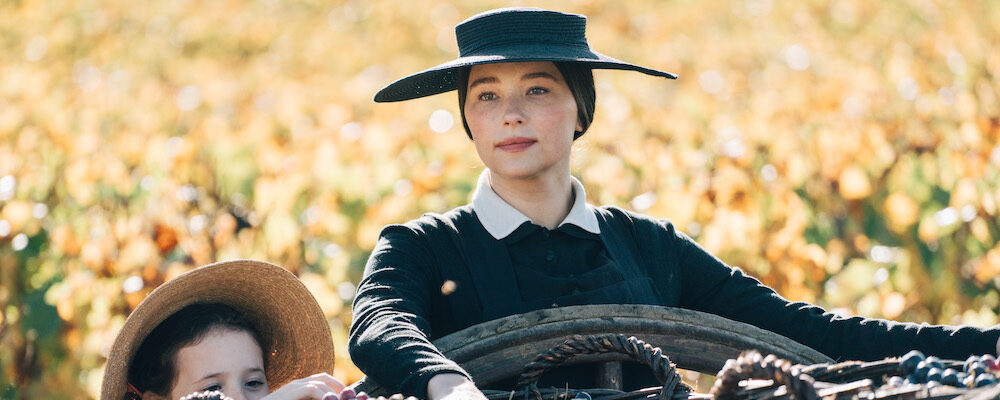In ‘Widow Clicquot,’ Haley Bennett Battles the Patriarchy as the Remarkable Grande Dame of Champagne
Sandra Miska
Out of the ashes of tragedy, an early 19th century French woman rises to build her late husband’s family company after his premature death in Thomas Napper’s “Widow Clicquot,” a lush biopic based on Tilar J. Mazzeo’s 2008 biographical book, “The Widow Clicquot.” Haley Bennett, who also serves as a producer, gives a compelling, nuanced performance as the titular character, Madame Barbe-Nicole Clicquot Ponsardin, the eponymous founder of Champagne house Veuve Clicquot. The young Madame Clicquot uses knowledge imparted by her late husband, François Clicquot (Tom Sturridge), along with her own instincts and determination, to take over the running of his vineyard. Unfortunately, she has more than just the patriarchy in her way.
Technically, “Widow Clicquot” is a corporate biopic. But this is not your conventional portrait of the grande dame of Champagne, Madame Clicquot, who was blazing trails more than a century before French women were even granted the vote. Instead, this is a romantic, almost dreamy, atmospheric film that deals with love, grief and mental illness. And, while it is a visually stunning, there is much substance beyond its costumes and French sunsets. The filmmakers, including Bennett, like the widow herself, break free from convention to tell this part of Clicquot’s story.
“We definitely wanted to make a distinction between the commercial aspect of Veuve Clicquot with the spiritual acts of creation,” Bennett told Entertainment Voice during a recent interview. At times, it feels like you can almost taste Barbe-Nicole’s enthusiasm for her Champagne, as her love for the process jumps through the screen.
“Widow Clicquot” begins with the funeral of François, and Barbe-Nicole flashing back to the height of what was once a passionate love affair. However, it becomes clear that their life together is far from a fairy tale, as the beginning and end of their marriage is marred with sadness. Towards the end, she becomes her husband’s caretaker and has to send their young daughter away to a convent, where the girl remains after her father dies in order to have some stability, adding another layer of tragedy to Barbe-Nicole’s story.
Following the funeral, Barbe-Nicole reveals her intention to take over the running of the vineyard, and receives pushback from her father-in-law, Philippe (Ben Miles). He would rather sell, even though she has learned the ropes of the wine business from François, who had a romantic approach to things, even singing to the vines. She not only soaked up everything he taught her, but also has a strong business sense, one that he lacked. But the most brilliant entrepreneur can face unpredictable elements, such as weather and man-made conflict, and this is the period of the Napoleonic Wars. Against the odds, Barbe-Nicole strategizes a plan to sell the champagne she produces by going around Napoleon’s strict trade embargo.
Audiences may be more than two centuries removed from Barbe-Nicole’s time, but Bennett, along with director Thomas Napper and writer Erin Dignam, do an excellent job of making their Champagne heroine’s struggles relatable. Bennett revealed how her role as a producer helped her better connect with her character. “There was so much up against her… I make jokes, because there were so many forces against us making the film itself. To make [“Widow Clicquot”], we really had to adapt and become inventive. We made the production independently, and it was pretty scrappy, and we had to embrace all of these challenges.”
Barbe-Nicole proves to have a very democratic management style, as she implements the concept of the wheel, which would allow all of her employees to have a voice when it comes to the running of the company. This raises eyebrows from some of the men around her, including Louis (Sam Riley), her distributor. However, what they perceive as feminine weakness proves to be a strength. Despite some of his shortsightedness, Louis, who was also close to François, proves to be a valuable asset to Barbe-Nicole.
Louis also reminds Barbe-Nicole of her late husband, although he is more pragmatic and mentally strong; each man represents a different part of her. But the relationship between Louis and Barbe-Nicole is an emotional anchor for both. “They share something passionate, and there’s no frills to the relationship. It’s business, and she’s not being a mother to him. She’s not taking care of him. I think that is really cool about their relationship,” explains Bennett.
The climax of “Widow Clicquot” takes place in a courtroom, where Barbe-Nicole has been summoned for going against the Napoleonic Code, which states a woman can only run a business if she is a widow. Essentially, she is accused of skirting the law by remaining a widow, because the thinking of that time period was that no attractive young woman would remain unmarried unless she had something to gain, financially. Eventually, Barbe-Nicole has to make a decision, and it is this moment which drives home that both Barbe-Nicole’s story and Bennett’s performance are full of body, containing little fizz.
“Widow Clicquot” releases July 19 in select theaters.

